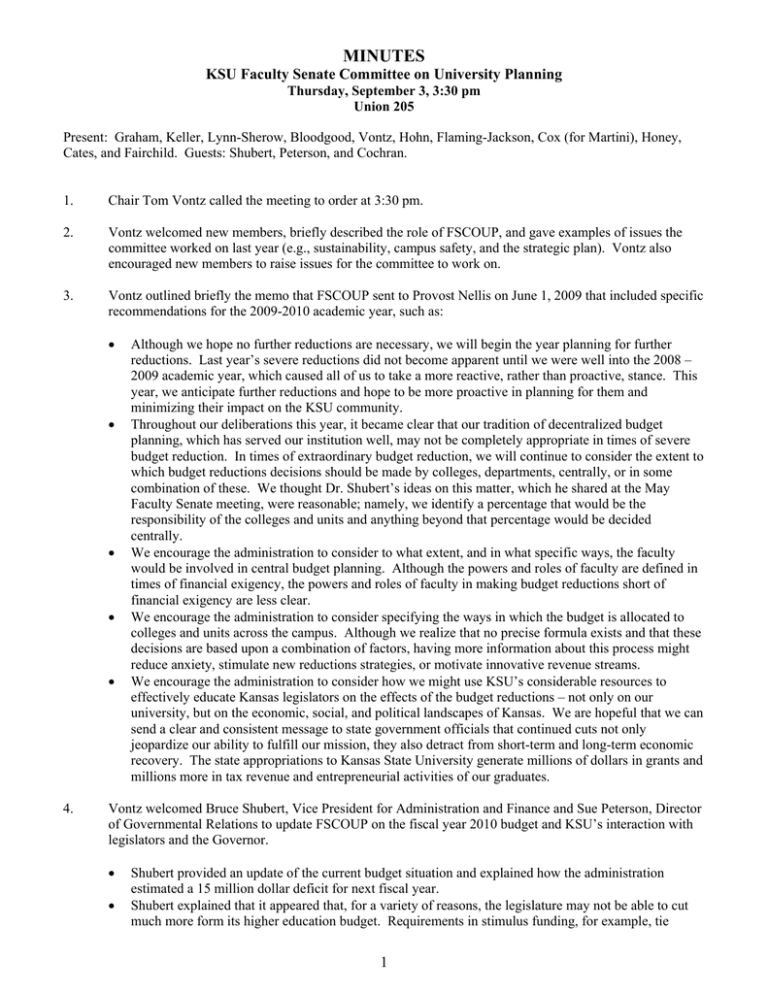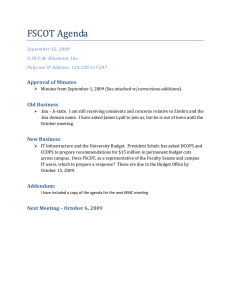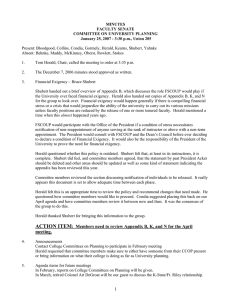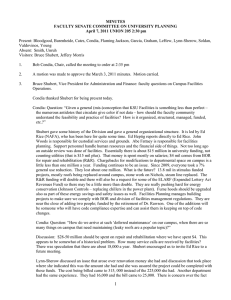MINUTES KSU Faculty Senate Committee on University Planning
advertisement

MINUTES KSU Faculty Senate Committee on University Planning Thursday, September 3, 3:30 pm Union 205 Present: Graham, Keller, Lynn-Sherow, Bloodgood, Vontz, Hohn, Flaming-Jackson, Cox (for Martini), Honey, Cates, and Fairchild. Guests: Shubert, Peterson, and Cochran. 1. Chair Tom Vontz called the meeting to order at 3:30 pm. 2. Vontz welcomed new members, briefly described the role of FSCOUP, and gave examples of issues the committee worked on last year (e.g., sustainability, campus safety, and the strategic plan). Vontz also encouraged new members to raise issues for the committee to work on. 3. Vontz outlined briefly the memo that FSCOUP sent to Provost Nellis on June 1, 2009 that included specific recommendations for the 2009-2010 academic year, such as: • • • • • 4. Although we hope no further reductions are necessary, we will begin the year planning for further reductions. Last year’s severe reductions did not become apparent until we were well into the 2008 – 2009 academic year, which caused all of us to take a more reactive, rather than proactive, stance. This year, we anticipate further reductions and hope to be more proactive in planning for them and minimizing their impact on the KSU community. Throughout our deliberations this year, it became clear that our tradition of decentralized budget planning, which has served our institution well, may not be completely appropriate in times of severe budget reduction. In times of extraordinary budget reduction, we will continue to consider the extent to which budget reductions decisions should be made by colleges, departments, centrally, or in some combination of these. We thought Dr. Shubert’s ideas on this matter, which he shared at the May Faculty Senate meeting, were reasonable; namely, we identify a percentage that would be the responsibility of the colleges and units and anything beyond that percentage would be decided centrally. We encourage the administration to consider to what extent, and in what specific ways, the faculty would be involved in central budget planning. Although the powers and roles of faculty are defined in times of financial exigency, the powers and roles of faculty in making budget reductions short of financial exigency are less clear. We encourage the administration to consider specifying the ways in which the budget is allocated to colleges and units across the campus. Although we realize that no precise formula exists and that these decisions are based upon a combination of factors, having more information about this process might reduce anxiety, stimulate new reductions strategies, or motivate innovative revenue streams. We encourage the administration to consider how we might use KSU’s considerable resources to effectively educate Kansas legislators on the effects of the budget reductions – not only on our university, but on the economic, social, and political landscapes of Kansas. We are hopeful that we can send a clear and consistent message to state government officials that continued cuts not only jeopardize our ability to fulfill our mission, they also detract from short-term and long-term economic recovery. The state appropriations to Kansas State University generate millions of dollars in grants and millions more in tax revenue and entrepreneurial activities of our graduates. Vontz welcomed Bruce Shubert, Vice President for Administration and Finance and Sue Peterson, Director of Governmental Relations to update FSCOUP on the fiscal year 2010 budget and KSU’s interaction with legislators and the Governor. • • Shubert provided an update of the current budget situation and explained how the administration estimated a 15 million dollar deficit for next fiscal year. Shubert explained that it appeared that, for a variety of reasons, the legislature may not be able to cut much more form its higher education budget. Requirements in stimulus funding, for example, tie 1 • • • • 5. funding for higher education to levels for K-12 education and Kansas cannot reduce the budgets of higher education institutions below 2006 actual expenditures. Currently, we are close to 2006 levels. Peterson provided a brief update of KSU’s efforts in the legislature and announced the reinstatement of the University Committee on Governmental Relations. Peterson explained the committee’s specific efforts were yet to be worked out; however, she explained the committee’s main task would be to communicate with campus constituencies on political issues and design and coordinate advocacy efforts on behalf of university stakeholders. The committee will report to the President. Shubert explained that President Schulz and the university administration are now seeking the ideas of faculty and staff to 1) reduce the budget and/or 2) generate revenue. Shubert reminded members that faculty and staff and have several avenues through which to voice their ideas including the anonymous survey on our KSU webpage, through their DCOP, CCOP, or through FSCOUP. Shubert also reminded members that while DCOPs and CCOPs serve specific roles in times of financial stress or exigency, we are not in financial stress or exigency and their role right now is to generate ideas about budget reduction or revenue generation — within and between departments, colleges, and throughout the entire university. Shubert and Peterson assured the committee that they would share new information after they had received it and offered to come back to our FSCOUP meetings as needed. Member Cox asked Shubert about the process for evaluating the ideas that were submitted to the administration. Shubert said that the details of that process are yet to be worked out but certainly a variety of factors would be considered. Senator Fairchild said that among the factors that might be favorably considered were those ideas that seemed to have a lasting impact—on revenue generation or budget reduction. Vontz asked the committee how it might assist in the budget process. After deliberation and discussion, the committee decided to: 1. Send an email to President Schultz offering that FSCOUP assist the President, in an advisory capacity, in evaluating the budget reduction and revenue generation ideas that were submitted by various groups and individuals across campus. 2. Write a clear brief memo to our faculty colleagues describing the roles of DCOPs and CCOPs in the budget process. In particular, we should stress that the current role of DCOPs and CCOPs is to generate ideas to reduce the budget or to generate revenue. 3. FSCOUP will encourage the administration to publish information on the budget and make it easily available to faculty and the KSU community. 6. Next Meeting: Thursday October 1 at 3:30 in Union 205. 2


